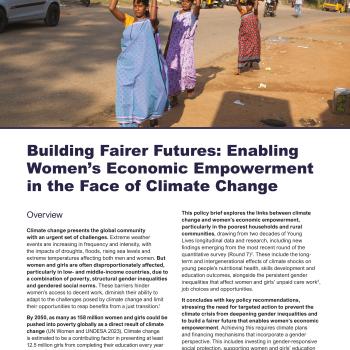
Drawing on two decades of Young Lives longitudinal data and research from the four study countries, Ethiopia, India, Peru and Vietnam, this policy brief explores how climate shocks impact women’s economic empowerment, particularly in the poorest households and rural communities. It reveals that climate shocks have long-term and inter-generational effects on young people’s nutritional health, skills development and education outcomes. Together with persistent gender inequalities these affect women and girls’ unpaid care work, job choices and opportunities.
The authors put forward key policy recommendations to deliver targeted action to prevent the climate crisis from deepening gender inequalities and to build a fairer future that enables women’s economic empowerment.

Drawing on two decades of Young Lives longitudinal data and research from the four study countries, Ethiopia, India, Peru and Vietnam, this policy brief explores how climate shocks impact women’s economic empowerment, particularly in the poorest households and rural communities. It reveals that climate shocks have long-term and inter-generational effects on young people’s nutritional health, skills development and education outcomes. Together with persistent gender inequalities these affect women and girls’ unpaid care work, job choices and opportunities.
The authors put forward key policy recommendations to deliver targeted action to prevent the climate crisis from deepening gender inequalities and to build a fairer future that enables women’s economic empowerment.

